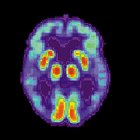 | This is a PET scan of a brain affected by Alzheimer's disease. PET scans are used to show which brain cells are healthy and which cells are dead. In this picture, healthy cells are shown as green or red. The picture is courtesy of wikipedia.com. |
 |
I hope the information I have learned and gathered here, helps you and your family understand more about alzheimer's disease. Thank you for visiting.
What Is Alzheimer's Disease? Alzheimer's disease is the most common type of dementia, accounting for more than half of all dementia cases. More than 35 million people worldwide have the disease. More than 50% of alzheimer's dementias go undiagnosed for years. The reason cases go undiagnosed is the family assumes their loved one is just suffering from "old age". Another reason alzheimer's cases go undiagnosed is the person with alzheimer's is afraid, ashamed, or in denial about their illness.
What Are The Symptoms Of Alzheimer's Disease? Alzheimer's disease symptoms include progressive memory loss, altered thinking, depression, weight loss, decreased interest in former activities. Alzheimer's disease has a slow downward course, with the person becoming more impaired with time until eventual death. There are drugs available to treat alzheimer's disease, and if the drugs are given early in the disease, the drugs significantly slow the progression of alzheimer's disease.
Alzheimer's Disease Occurs in Stages Alzheimer's disease occurs in stages. Some alzheimer experts believe there are three stages of alzheimer's disease, early or mild alzheimers, mid or moderate stage alzheimer's, and severe, end stage alzheimer's. Signs and symptoms vary by the stage of the disease.
Early and Late Onset Alzheimer's Disease Alzheimer's disease can occur at any age from age 30 to 100. Generally, alzheimer's disease that is diagnosed before age 65 is called early-onset alzheimer's disease. Alzheimer's disease that occurs after age 65 is called late- onset alzheimer's disease. Early- onset alzheimer's is the kind of alzheimer's that tends to run in families because of certain gene mutations. Early- onset alzheimer's tends to be more severe at the start and progresses downward more quickly than does late- onset alzheimer's disease.
Alzheimer's Disease Is Not Part Of Normal Aging Alzheimer's disease is not a part of normal human aging. Many older persons never get the disease. However, the incidence of Alzheimer's disease does tend to increase with age, so that among those age 85 or older, more than 40 percent will show some signs of Alzheimer's disease.
What Causes Alzheimer's Disease? The cause of alzheimer's disease is not fully known yet, but research shows that a compound called beta amyloid may be the cause. When the brains of alzheimer patients are looked at under a microscope, plaques of beta amyloid are found around and in dying brain cells, as well as an abnormal protein called tau. If beta amyloid is put in healthy living culures of human brain cells, the cells start to die. Science knows beta amyloid is directly toxic to brain cells. Science also knows that factors in our evironment, such as iron or copper can accelerate the formation of beta amyloid in brain cells. Putting all this together, current thinking is that beta amyloid kills brain cells by generating harmful free radicals. Other things, like copper or iron can accelerate the formation of free radicals by amyloid. Some researchers think that antioxidants, which absorb and trap harmful free radical molecules, might delay or alter Alzheimer's disease. Antioxidants, such as vitamin E, or the sleep hormone, melatonin, have been shown to sharply reduce the toxic activity of beta amyloid. The lesson from the latest research is that a diet rich in antioxidants, such as found in whole grains, bright- colored vegetables and fruit will help prevent alzheimer's disease and preserve memory.
Does High Cholesterol Cause Alzheimer's Disease? New research now suggests that high blood cholesterol may help cause alzheimer's disease. Studies have shown that people who take cholesterol-lowering medications, including the statins, have a greatly-reduced risk of getting alzheimer's disease. Recently, researchers fed rabbits a diet rich in cholesterol. The rabbits in the study who ingested large amnounts of cholesterol and saturated fats had amyloid in their retina and in their brains,in much the same way as the amyloid in alzheimer's brains. Until more is known, it might be wise to limit the control of saturated fats as a way to preserve memory.